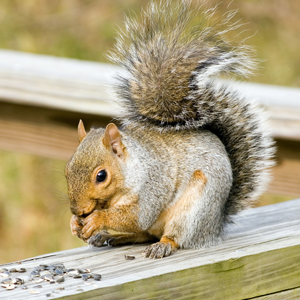Squirrels In Your Attic
By Chris Williams on January 17, 2014.
 John Maher: Hi. My name is John Maher. Today, I’m here with Dave Beaulieu, a Wildlife Specialist at Colonial Pest, a pest control company serving Eastern Massachusetts, and Southern New Hampshire, and Maine. Today we’re talking about squirrels in your attic.
John Maher: Hi. My name is John Maher. Today, I’m here with Dave Beaulieu, a Wildlife Specialist at Colonial Pest, a pest control company serving Eastern Massachusetts, and Southern New Hampshire, and Maine. Today we’re talking about squirrels in your attic.
Welcome, Dave.
Dave Beaulieu: Good morning, John, pleasure to be here with you.
John: Good. Dave, I have something in my attic that’s making a racket a night. What could that be?
Dave: We get a lot of these. It could be two things, but one of the big ones are flying squirrels. They’re very, very obnoxious. We get a lot of calls from customers that are primarily in rural, heavily wooded areas. These are very common there.
You’ll get a lot of sleepless nights. You’ll get a lot of ruckus activity. The operative word is usually party in the attic, which would describe flying squirrels to a “T.” It’s a big part of what we do. Most of our customers value their sleep at night and with flying squirrels in the attic sometimes that’s a difficult thing.
John: Why at night in particular?
Dave: It’s just the nature of the animal. They are pretty quiet during the day. They’ll be up in the insulating blanket sound asleep and then right around dusk or anytime there after once they wake up. They are again party time. They are very social so there is a lot of times numbers involved, could be as many as a dozen or more, all active at the same time where you are trying to get a good night sleep and these things trying to prevent that, so it’s a big job for us in a lot of cases. But when we are done, it’s an end all cure all.
John: Right. So I am finding acorns stored in attic, does that mean I have a squirrel problem.
Dave: A lot of customers automatically think that. You make the association between squirrels and acorns, which is right in a sense. But the problem is, we’ll say grey squirrels here specifically, they store all that. We use the word cache, it’s all stored in the outside of the house. They don’t generally bring things in. Whereas mice, once they are in, they are kind of locked into the structure so they bring in whatever they can. Believe it or not, acorns are very, very common for mice to bring into structures, and then to find them in weird places. It’s definitely a characteristic of mice.
John: So if I see acorns in my attic, the tendency would be to think that they are squirrels but really it’s probably a mice problem.
Dave: Absolutely. And sometimes it’s a hard thing to convince the customer but once we get into it we can put out some identification traps or something of that nature we can show the customer that this is actually a mouse problem.
John: What are some signs that I have squirrels in my attic then?
Dave: There are a number of things, the main thing is usually noise. Customers will hear them before they see anything, and then they start to look around and realize there is possibly a hole in the soffit or something of that nature or this time of year we get a lot of customers that are going up to get their holiday decorations and there has been some encounters. They go up there and actually see the animal or damage done by the animal.
John: OK. So I think that I might have a squirrel problem, what do I do first?
Dave: Well, first thing you want to do is call us, we’ll come in and assess the problem and tell you what you are up against. Tell you what type of squirrel it is which is very important because the junctures that we need to seal to prevent future problems are dependent upon the type of squirrel we are dealing with.
John: OK. How do you get squirrels out of the attic and keep them from coming back?
Dave: It’s a trapping process. We need to physically remove the animals that are causing the damage and we use the term damage to describe any squirrel that has basically got into a structure, no matter the extent of it, they did damage getting in, they’ll do further damage over time. So we’ll physically remove those animals and then the type of space that they use or potentially could use we’ll seal off permanently to prevent any future problems.
John: Do you seal that off by just boarding it back up again or do you actually put in any metal to keep them from scratching or biting through the walls or how does that work?
Dave: Yeah, absolutely. Squirrels obviously are chewing animals. The grey squirrels and the red squirrels have more chewing capabilities than the flying squirrels do. But we are using galvanized metal screen on just about everything we use to seal the junctures, vents and whatever else could be used. In some cases chimneys are related to the issue. We’ll put a stainless steel cap on the chimney and make sure that everything that’s open and accessible can no longer be exploited.
John: OK. Well Dave thanks very much for speaking with me.
Dave: It’s a pleasure John, thank you very much.
John: And for more information you can visit the website at colonialpest.com or call 1800‑532‑8084 for a free quote…